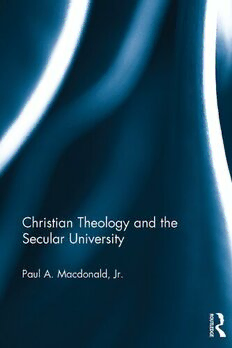Table Of ContentChristian Theology and the
Secular University
If the secular university by definition is non-sectarian or non-denominational,
then how can it accommodate a discipline like Christian theology? Doesn’t the
traditionalgoaloftheologicalstudy, whichistoattainknowledgeofthe divine,
fundamentally conflict with the main goal of secular academic study, which is
to attain knowledge about ourselves and the world in which we live? So why
should theology be admitted, or even care about being admitted, into secular
academiclife?Andeveniftheologywereadmitted,whatcontributiontosecular
academic life could it make?
Working from a Christian philosophical and theological perspective but also
engaging a wide range of theologians, philosophers, and religious studies scho-
lars, Christian Theology and the Secular University takes on these questions,
arguing that Christian theology does belong in the secular university because it
provides distinct resources that the secular university needs if it is going to ful-
fill what should be its main epistemic and educative ends. This book offers a
fresh and unique perspective to scholars working in the disciplines of theology,
philosophy, and religious studies, and to those in other academic disciplines
who are interested in thinking critically and creatively about the place and
nature of theological study within the secular university.
Paul A. Macdonald, Jr. holds an endowed chair in the Department of Philoso-
phy at the United States Air Force Academy.
This page intentionally left blank
Christian Theology and the
Secular University
Paul A. Macdonald, Jr.
K ~~o~;J~n~~~up
ORKYOR LONDOLNLOONNDDOONN
Y
LONDONANDNEWYORK
Firstpublished2017
byRoutledge
2ParkSquare,MiltonPark,Abingdon,OxonOX144RN
andbyRoutledge
711ThirdAvenue,NewYork,NY10017
RoutledgeisanimprintoftheTaylor&FrancisGroup,aninformabusiness
©2017PaulA.Macdonald,Jr.
TherightofPaulA.Macdonald,Jr.tobeidentifiedasauthorofthiswork
hasbeenassertedbyhiminaccordancewithsections77and78ofthe
Copyright,DesignsandPatentsAct1988.
Allrightsreserved.Nopartofthisbookmaybereprintedorreproducedor
utilisedinanyformorbyanyelectronic,mechanical,orothermeans,now
knownorhereafterinvented,includingphotocopyingandrecording,orinany
informationstorageorretrievalsystem,withoutpermissioninwritingfrom
thepublishers.
Trademarknotice:Productorcorporatenamesmaybetrademarksor
registeredtrademarks,andareusedonlyforidentificationandexplanation
withoutintenttoinfringe.
BritishLibraryCataloguinginPublicationData
AcataloguerecordforthisbookisavailablefromtheBritishLibrary
LibraryofCongressCataloging-in-PublicationData
Names:Macdonald,PaulA.,author.
Title:Christiantheologyandthesecularuniversity/byPaulA.MacdonaldJr.
Description:NewYork:Routledge,2017.|Includesbibliographicalreferences
andindex.
Identifiers:LCCN2016035788|ISBN9781472484895(hardback:alk.paper)|
ISBN9781315571904(ebook)
Subjects:LCSH:Universitiesandcolleges--Religion.|Theology--Studyand
teaching(Higher)
Classification:LCCBV1610.M232017|DDC230.071/1--dc23
LCrecordavailableathttps://lccn.loc.gov/2016035788
ISBN:978-1-4724-8489-5(hbk)
ISBN:978-1-315-57190-4(ebk)
TypesetinSabon
byTaylor&FrancisBooks
For my wife, Jennifer Winslow Macdonald
This page intentionally left blank
Contents
Preface ix
Introduction 1
1 Whose theology? Which university? 10
Theology and skepticism, or theology without a subject matter 11
Theology as a realist intellectual discipline, or theology as
knowledge 20
Secularism, secularity, and the secular university 28
The non-secularist, inclusively secular university 37
2 Theology in the secular university: a critical analysis of the
current debate 53
The secularist study of religion and the “secular perspective” 54
Inclusivism, part one: theology as a secular academic discipline 63
Inclusivism, part two: theological inclusivists 68
Theology as an exclusively sectarian academic discipline 75
Theology in the secular university as “faith” seeking
understanding 81
3 An epistemology of truly liberal learning 98
Knowing the truth is its own end 99
Critical thinking and the truth as telos 108
The intellectually virtuous pursuit of knowledge and truth 113
Understanding as an epistemic and educative end 120
Wisdom: the ultimate epistemic and educative end 124
4 Theology and truly liberal learning in the secular university 139
Reasoning and critical thinking in theology 141
Theological study as growth in intellectual virtue 150
viii Contents
Contemplative reasoning, theology, and the pursuit of
understanding and wisdom 159
Theological study as oriented towards theological knowledge and
truth 167
5 Theology and moral education in the secular university 183
Moral education and the secular university 184
Wisdom and moral education in the secular university 190
Theology, wisdom, and moral education in the secular
university 198
Theology, the secular university, and the common good 209
Conclusion 223
Index 227
Preface
For a long time, I took it for granted that Christian theology belonged in the
secular university. I did graduate work in Christian philosophy and theology
(and philosophy of religion, more broadly) at two major, secular universities
(Yale University and the University of Virginia) and never once called into
question whether the theological study that I engaged in, under the direction of
some premier philosophers and theologians (Christian and otherwise), was
somehow out of place or inappropriate, let alone deficient or unworthy of
broader university study. Although I certainly realized that not all of my fellow
secular-university citizens were Christian, or even religious, I also realized that
Christian theology was as intellectually rigorous as any other course of study,
was characterized by the highest level of rational argument, and consequently
could make reasonable claims about its ability to furnish the knowledge or
understanding of divine matters which, asa person of Christian faith, I earnestly
sought then and continue to seek out.
After leaving graduate school and completing two postdoctoral fellowships
(one at Princeton University, the other at Villanova University), I began teach-
ing and doing Christian theology within a secular religious studies department
at Bucknell University, a nationally ranked, secular liberal-arts college. At this
point in my career, I was more fully aware of the broader debate surrounding
the place and nature of theological study in the secular university, and in
particular secular religious studies. And although I was supported in my own
pedagogical and scholarly theological endeavors by my department, I realized
that theology’s place in the wider secular university was by no means secure.
Or, to be more specific, I realized that the place of traditional theological
inquiry, as a tradition-based form of rational inquiry into the existence and
nature of the divine, was by no means secure (for reasons I will discuss at
length in this book).
During my second year at Bucknell, I became involved in an intercollegiate
research project and workshop, sponsored by The Teagle Foundation, dedicated
to investigating the place and role of “big questions” (questions about meaning,
purpose, and value) in the secular liberal arts. The more deeply I became
involved in this project over the years (since it lasted well beyond its initial,
proposed termination date), the more I became interested in and committed to

